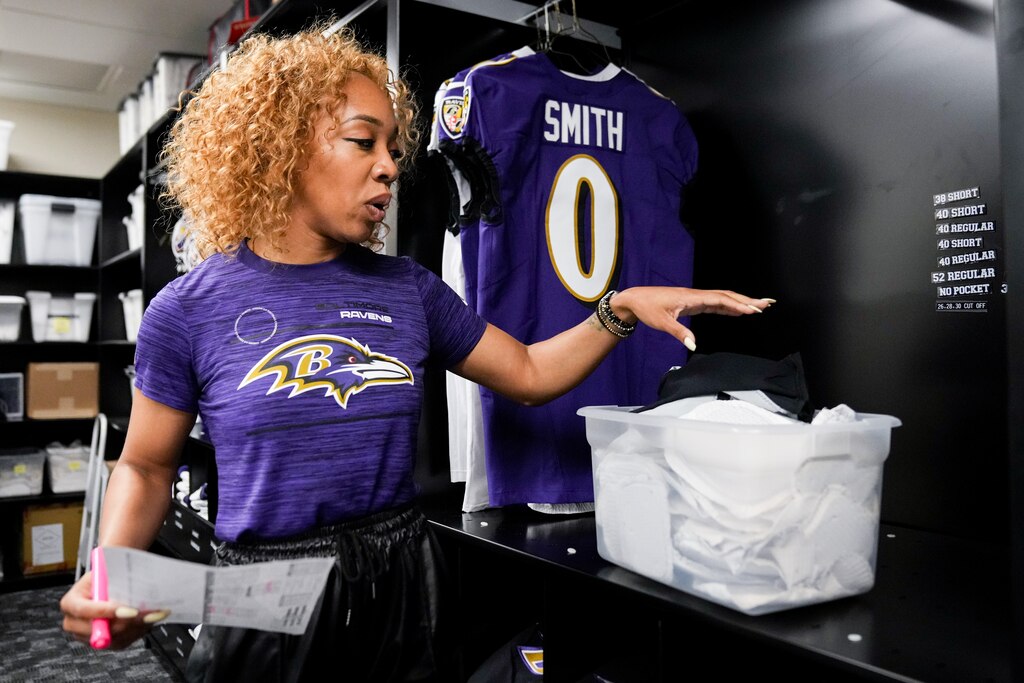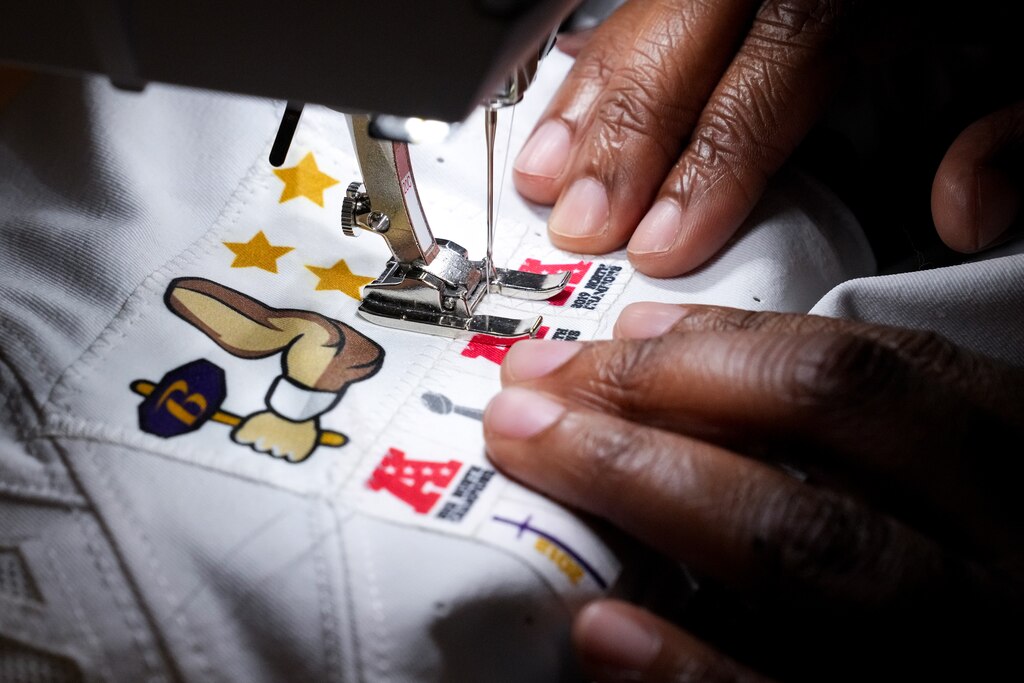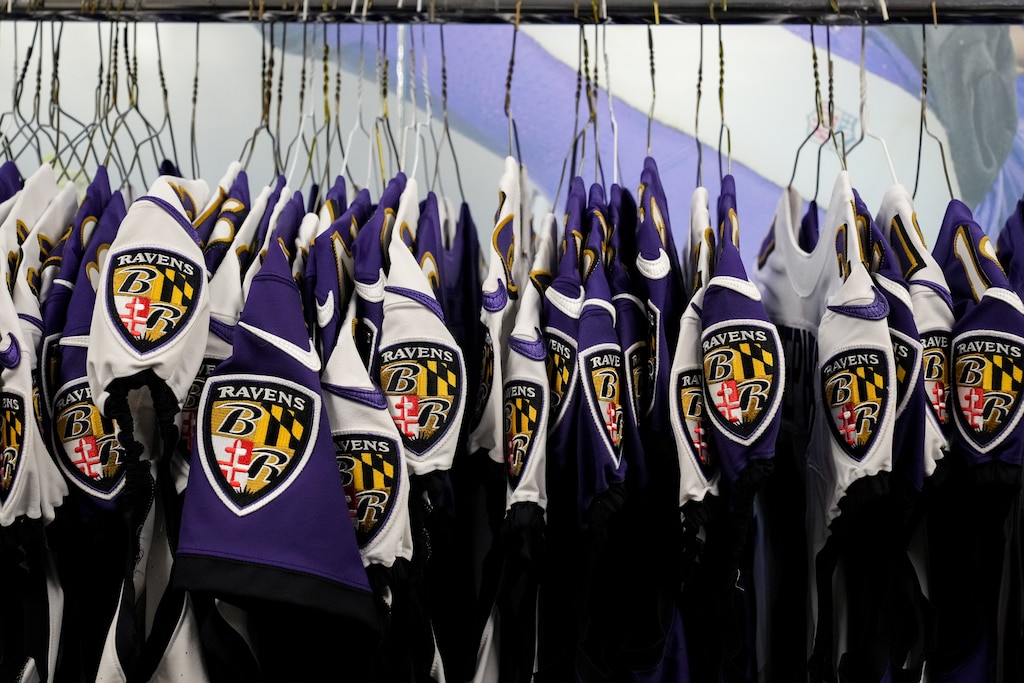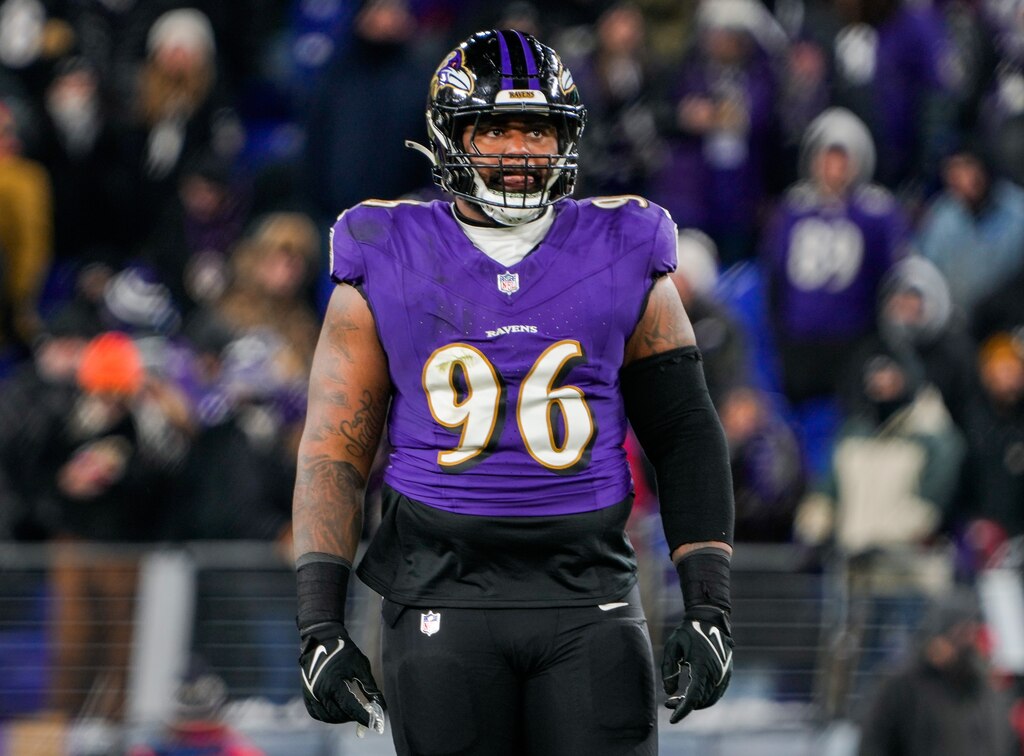It was her dad, a longtime Pop Warner football coach in Northeast Baltimore, who taught Ebony Short to use the sewing machine.
Brian Short Sr. insisted he knew the basics from his home economics class, so he showed his middle school daughter how to thread the needle. Ebony’s mom, Tracey, had to step in as her daughter’s interest in fashion grew and her projects got more complex.
Who knew their daughter’s hobby would lead to work in professional football — after a stop on Broadway — as the Ravens’ sewing manager?
Years later, Short is leading a team of five in-house seamstresses for the Ravens as they outfit the players through a grueling season. They sew about 3,500 pads into pants. They paint cleats. They customize the fit of uniforms. And they sew jerseys — so many jerseys.
“Eeesh I mean, I don’t — I would say, I mean thousands,” Short said when trying to guess the breadth of the job. “... That’s not including if people give things away and things get demolished. So it’s easily, I mean, I wouldn’t even know a number, but definitely thousands of uniforms that get used up in a season.”
Not every team in the NFL has someone like Short and her staff. The Browns are the only other team with an in-house seamstress, and it’s a team of one. Many send their uniforms out for alterations. On game day, Short has found opposing teams rely on equipment managers for uniform adjustments or repairs. Visiting equipment managers sometimes seek out Short for advice.
By employing in-house seamstresses, the Ravens have a level of customization most teams do not.
“Having an in-house team allows us to personalize everything – including fitting custom padding that a player might need due to an injury – and be able to do it quickly,” said Kenico Hines, the Ravens’ head equipment manager.
As a woman in both a traditionally female field (sewing) as well as and a traditionally male field (football), Short is changing the game one stitch at a time.
Putting on the show
Short’s journey to the Ravens started in East Baltimore, where she cheered on her brothers as they played football and huddled with her mother as the two crafted her prom dress.
Short was a cheerleader and an artist. She also knew her X’s and O’s and was a big fan of Ravens safety Ed Reed and his hard-hitting style.
She never fit in one box. Even when she went to art school, one of the most specialized colleges you can choose, her interests varied. Outsiders often looked at her choices as limiting, but Short never considered a career in the arts as having boundaries.
“It’s like they only saw it in one sector, but it’s actually been way bigger than that,” Short said.
At Parsons School of Design, Short tried various mediums and forms of art. She was attracted to the creative process as much as the feel of clay squishing through her hands or the scratch of a brush on canvas.
“Shoot, a hyena. Would I have ever guessed that making a bunch of hyenas for ‘Lion King’ or all these flower ensembles, that I would use them sewing pads inside of pants?”
Ebony Short, Ravens sewing manager
Although she got her hands messy in every field, the ultimate goal was always fashion. She loved evening wear and, “funny enough,” menswear. Based on her interests, people recommended Short look into costuming.
That’s how she found herself working on Broadway. She joined a studio that created costumes for shows, dances, movies and other performances in New York.
One of the first productions she was assigned to was “The Lion King.” As a first hand, she didn’t have just one job. One day she might make hats; the next, she might cut out patterns. For “The Lion King,” Short worked on the hyena costumes, cutting them out and constructing them by slipping foam pads into the fabric.

Another time, Short helped “engineer” Cinderella’s dress so that the actors could go through quick changes. Another costume she worked on lit up, and she had to understand the wiring for it.
“You’re figuring out how to hide the cape but still make it look pretty and decorate the fabric,” Short said. “You become a sculptor and an engineer and a sewer, all of the above.”
While she was working at the studio, Short said, she traveled to take on a variety of projects. After doing some things with Disney, she came up with a plan to head to the West Coast.
“I was going to do a gig with Cher because she was going on tour and she needed to be fit for costumes,” Short said. “And I was like, ‘Great, we’ll do that.’ And then I was going to work on some movies and I was going to be in California.”
First, she headed back to Baltimore to visit her family.
Plot twist
“What is that quote? Tell God your plan and He’ll laugh at you?” Short said, making a note to look it up because it perfectly describes how her well-thought-out plan went.
Short’s sister had stumbled across a job opening for the Ravens’ sewing manager, and she immediately thought of her costume-designing, Ravens-loving sister. Coincidentally, her sister was coming home for a visit.
When she saw it, Short did not understand what the Ravens were seeking or what “sewing manager” meant. That wasn’t necessarily a bad thing.

“It was one of those things that was intriguing enough like, ‘What exactly would they need?’” Short said.
Short went in for an interview with few expectations. She walked out energized and filled with ideas.
“I was like, ‘Maybe I won’t do Cher,’” Short said with a laugh.
Her mom loved the idea of Short returning to Baltimore. Her siblings joked she automatically became her grandfather’s favorite child by taking a job with the Ravens.
It’s not a job Short ever knew to dream of. Even as an avid football fan, she didn’t know there were opportunities to work for teams without a sports-related background.
Her former co-workers were not surprised. Short always stood out among the costume designers for her love of football. There was one friend in that field she talked football with because she was an avid Philadelphia Eagles fan. Her reaction to Short’s career shift was to ask how she could find a similar job.
The field’s the stage
Theater costumes and football uniforms sound as if they couldn’t be more different. But Short found herself calling on her theater experience daily.
“There’s little tricks that I might do to lay something that I might use for something else. Shoot, a hyena. Would I have ever guessed that making a bunch of hyenas for ‘Lion King’ or all these flower ensembles, that I would use them sewing pads inside of pants?”
She called on her experience with the light-up dress as she learned to mic up players and hide the wires. And, when she customizes shoes at a player’s request, she’s calling on her painting and design experience.
She’s discovered the frantic lead-up to opening night is similar to the approach of game time — but on a weekly schedule and with a cast of only men.
Short has emphasized the importance of getting ahead. She said that, almost as soon as the final game ends, her team starts making the pads that fit into players’ pants. The five of them — Arminee Bunting, Michele Geiman, Ernestine Martin, Kendra Shapanus and Najuma Simon — embroider numbers and nameplates so the players can just grab them as needed once the next season starts.
Then, it’s mostly about maintaining jerseys. She said about 70% of them need a “trim and shave” — as in, they need the loose threads and fuzzies cleaned up. If it’s a game tied to a theme, such as the league’s Crucial Catch initiative to raise cancer awareness, they will also add custom patches. And, of course, they constantly have to be ready to create new jerseys for any players who are added to the team or jerseys to replace those given away.
“We try to get ahead of knowing when a player is going to do an exchange so that we’re ready with an extra jersey after the game,” Hines said. “In a perfect world, players would tell us at least a week in advance, but that doesn’t always happen. We cringe when some players whose jerseys have more customization give away theirs at a moment’s notice, because replacing them is extra work for our team. We also are very protective over the black jerseys since we don’t have as many of those since they’re worn less often.”
On a typical week before a Sunday game, Short said, they usually get all the jerseys back from the cleaners on Tuesday and have to have everything ready by Wednesday, when the uniforms get packed. Game day is actually her slowest day. The goal is to have everything ready to go so that she and her team can hand things over to the equipment managers.

For Short, creativity doesn’t require colors, feathers or glitter. It comes in the form of problem-solving. And there’s been plenty of that required, even within the Ravens’ limited wardrobe and structured schedule.
Short found magic in the uniformity. Just as theater relies on hiding the tricks of lighting and costume changes from the audience, uniformity relies on hiding all the adjustments. And, under Short, Ravens uniforms have all manner of adjustments.
Short recognized that, while football uniforms all look the same, the bodies wearing them are very different. An offensive lineman is different from a wide receiver, who is different from a kicker, who is different from a linebacker. They all move differently, too, so the shape of the uniform affects them each in a unique way.
Now, under Short’s direction, every uniform is individually fitted, which is exactly what the Ravens were looking for when they created her position, Hines said, because owner Steve Bisciotti “wants the players to be taken care of, and part of that is to have the ability to customize jerseys and pants, based on the players’ individual needs.”
The Ravens had seamstresses on staff prior to Short, and she said players were always able to get hems and small adjustments. Now, with her expanded staff, the “world’s their oyster.”
When a defensive lineman brings his arm up to try to strip sack a quarterback, there should be no pull across the biceps, the shoulders or the collar. It’s a comfort thing. It’s also a competitive thing.

Broderick Washington, a defensive lineman, said he gets his pants fitted because they’re often too big. He also brings shoes to Short for customizations that let her exercise her painting skills, although he joked he keeps that on the low because, if everyone knew, his wait time would increase.
“I don’t want to steal what Deion [Sanders] says, but look good, feel good, play good,” Washington said. “It’s a real thing. For me personally, I want everything to fit nice and snug so I can go out there and just play ball.”
Newcomers at the team’s facility in Owings Mills don’t always know about the customizations Short and her team offer since they’re so rare. Players who leave are sometimes surprised to find they no longer have that option, Short said.
The Ravens see it as another way to make their preparations more efficient.
“The key moment [in deciding to add a sewing manager] was when we switched to Nike, and their pants had the traditional thigh pads included, and not all players want to use those, so being able to customize the pants really helps,” Hines said. “We are able to make them more protective, light and flexible, and that is something we wanted to be able to do at a moment’s notice.”
With the constant problem-solving, the shoe customization and her own artwork on the side, Short’s creative soul is being fulfilled.
Maybe someday Short will do costumes for Cher.
But the Ravens have offered something Broadway and theater, full of fame and glitter, could not. Here in Baltimore, as she was working on uniforms, Short met the one person who could make her speechless: Ed Reed.
This is the first story in a series called “Women of the Ravens” highlighting some of the women who help run various aspects of Baltimore’s NFL franchise and their paths to the male-dominated world of pro football.




Comments
Welcome to The Banner's subscriber-only commenting community. Please review our community guidelines.